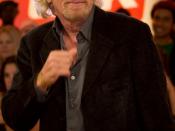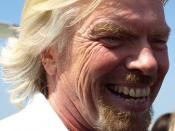Richard Branson
Richard Branson: "An entrepreneur is somebody who is willing to go where others are not. Who doesn't often listen to accountants. Who if somebody says [something is] impossible, is determined to prove them wrong".
Pick up any newspaper or magazine and there's a good chance you'll come across a picture of Richard Branson sporting his irrepressible toothy grin and trademark wooly jumper. Airline owner, daredevil stunt man and entrepreneur extraordinaire, few businessmen have captured the public imagination as completely as the larger-than-life chairman of Virgin. The press have elevated him to the status of folk hero, reporting his hot-air balloon and speedboat exploits with relish and devoting endless column inches to each new business venture.
Branson's earliest business venture was in fact as the publisher of a student magazine when he was still a 16 yr old school boy. However the real break came when, in a bid to raise more cash for the financially strapped magazine, he hit on the idea of selling discounted records by mail order.
The initial advertisement produced a flood of responses and he was soon able to open his first Oxford Street record shop in 1971. The purchase of a recording studio in 1972 proved a huge success when the first album released - Tubular Bells by Mike Oldfield - went on to sell five million copies. At the age of 23, Branson had made his first million. In the years since, artists, like Janet Jackson, Culture Club, the Human League, Phil Collins and Paula Abdul helped to turn the music division into one of the most successful record labels in the world. Branson later pulled off the deal of a lifetime when the sale of Virgin Music to Thorn EMI in 1992 netted the company a cool �0 million.
In the space of 25 years Branson has built a major entertainment empire with a turnover of �4 billion and 7,500 employees in 170 operating companies. Virgin interests around the world as they are now, consist of five holding companies: Travel, Retail, Communications, Hotels and investments. The two major divisions are Virgin Travel, and Virgin Retail. Virgin Travel is dominated by the airline Virgin Atlantic Airways, which started in 1984 and is now the second largest British long haul international airline operating a fleet of Boeing 747 aircraft to New York, Miami, Los Angeles, Orlando, Boston, San Francisco, Washington, Dallas, and Tokyo.
The airline was founded on the concept of offering competitive and high quality first class and economy services. It holds many major airline awards and recently earned "Airline of the Year Award" for the third consecutive year.
Virgin Retail is part of Virgin Group which has since expanded into international "Megastore" music retailing, books and software publishing, film and video editing facilities, and clubs and hotels throughout 100 companies in 15 countries.
So what are the management principles governing the company whose growth has been almost entirely self-generated, with only a handful of acquisitions and partnership deals?
Branson's management philosophy rests squarely on the 'small is beautiful' principle put forward by the economist EF Schumacher. According to Schumacher, it is only when a large organization is broken down into many small autonomous units, that the proper balance between freedom, which promotes creativity, and order, which gets things done, can be maintained.
This is a democratic style of management, it encourages group members to set their own objectives and delegate authority wherever possible, with workers being seen as human beings who can be trusted. As Branson says, 'Once people stop knowing the other people in the building, its time to break up a company into smaller units.
The ideal size is around 50 to 60 people. By keeping a company small, you give more people a chance.'
Branson's management style results in the highest productivity, and thus his employees have the greatest feeling of involvement and job satisfaction, it provides good communication and relationships on all levels.
In line with this philosophy, the highly decentralized management structure that has evolved at Virgin is a classic example of 'empowerment', with managers being given the freedom to organise the day-to-day running of their companies as they see fit .As one manager points out, he'll sometimes disagree with you but then says, 'Go ahead, you're the boss'. 'The fact that many of the top executives have been with the company since it started is perhaps the best proof that managers appreciate being given the room to follow their own judgement. Such a shifting or delegation of responsibility for decision making downwards through the organization encourages greater motivation, because of the autonomy gained.
People, when asked, might describe Branson as a leader. He certainly draws people to him like a magnet and supporters wholeheartedly give their time, effort and commitment in following his goals. Branson has the ability to motivate groups to achieve certain goals, without the use of force. Firms today in the fight for survival in an intensely competitive business world, need leaders like Branson at all levels, not just at executive level.
Branson inspires trust and creates confidence.
Leadership style refers to the way in which the individual manages the employees. A good leader is someone who is followed, rather than someone who obviously leads. People make the leader. Certain styles will gain respect, affection, trust and loyalty.
Max Weber has identified 3 types of organizations, Branson fits under the charismatic type of leadership where employees are devoted to their leader and work hard as a result, another example of this is within political parties.
Staff turnover is low in Branson's Empire. So what factors explain this loyalty? 'We're an entertainment company so things are done slightly differently to other companies', admits Branson. 'We don't have a clock-in, clock-out mentality. Because of this climate, people are quite willing to work long hours'. Based on the principle that people feel more motivated when they have a stake in the company's future, 85% of promotions are internal appointments. Other key factors include the use of incentive payment schemes and the fact that employees have the option of buying shares in the company. In fact, well over a dozen of the top managers at Virgin are now millionaires in their own right.
Branson has his own factors to his success;-
1. çÂÂçÂÂçÂÂçÂÂMotivated by something beyond money.
"Above all, you want to create something you are proud of.... That has always been my philosophy of business. I can honestly say that I have never gone into any business purely to make money. If that is the sole motive, then I believe you are better off doing nothing."
2. çÂÂçÂÂçÂÂçÂÂThe importance of a good name.
"All you have in life is your reputation: you may be very rich, but if you lose your good name, then you'll never be happy. The thought will always lurk at the back of your mind that people don't trust you. I had never really focused on what a good name meant before, but that night in prison made me understand."
3. çÂÂçÂÂçÂÂçÂÂBig picture thinking & creative problem solving
In his book, Branson tells the story of a Mike Oldfield concert that was to take place at Queen Elizabeth Hall. Oldfield, the featured artist, had decided he did not want to do it. This was a major promotional event, designed to bring visibility to Virgin Records' inaugural shining star. Tickets had been sold, the concert all set to go and Oldfield, that morning, was determined not to perform.
Branson's creative problem solving saved the day. The two went for a drive together in Branson's Bentley. After the drive, Branson asked if Mike would like the car, as a present. Mike said sure.
Branson said, "I'll get out here and walk home. You just keep on driving and the car is yours."
"Come off it! It was your wedding present."
"No, all you have to do is drive it around to Queen Elizabeth Hall and go up onstage tonight. It's yours."
Mike agreed. Tubular Bells eventually sold over thirteen million copies and became one of the best selling albums ever released in Britain.
4. çÂÂçÂÂçÂÂçÂÂDreaming impossible dreams.
Writes Branson, "My interest in life comes from setting myself huge, apparently unachievable challenges and trying to rise above them." Hence, in addition to successes in business, Branson became first to cross the Atlantic in a hot air balloon, the first across the Pacific, and the fastest to cross the Atlantic by boat. His life exhibits a "no limits" attitude that seeks to stretch the boundaries of what is achievable.
5. çÂÂçÂÂçÂÂçÂÂSuccess is not a formula, but it doesn't 'just happen.'
"To be successful, you have to be out there, you have to hit the ground running, and if you have a good team around you and more than a fair share of luck, you might make something happen. But you certainly can't guarantee it just by following someone else's formula." A swashbuckling entrepreneur who lives life to the full, Branson has seized life by the throat and given it all he's got. And from here? To think he's only half begun!
Richard Branson has made a career out of playing David to the other guy's Goliath. Where some entrepreneurs might take one look at the market dominance of the big players and think better of it, Branson actually delights in taking on and outmaneuvering large corporations.
Branson has developed a management strategy that he sticks by;- Hoist a pirate flag, play the underdog, pick your battles, hit them where it hurts and make a business crusade. Branson's alternative management style offers the following lessons to aspiring moguls: don't be a bread head, dress down every day (not just Fridays), put people first, blur the divide between work and play and shake it up (don't imitate, innovate).
Although Branson has many success stories, failures are part of the course to the top. Branson must be careful not to loose control of his massive empire, he must remain in contact with his people and the general public ensuring he is meeting business needs. He must be careful not to over extend himself, which he openly admits being close to a couple of times. With the market being so unstable especially at present times, a downturn in the market could easily result in his personal fortune taking a dive.
Last year in the Sunday Times, Virgin ranked highly in the top 100 best companies to work for, this year the same results have been published, yet Virgin have not made the list. Could this be the downfall of Branson's Virgin Empire? We will have to wait and see.
Branson has clearly fostered a winning management and leadership style at Virgin, delegating authority to his managers whilst leaving himself free to do what he does best - coming up with ideas for new ventures and getting them off the ground. The responsibility is huge, particularly with more than 50,000 people working for him.
Branson strives to live by his own business advice every day. "Make sure that anything you do," he says, "you create the best."
References
Advanced Business, 2nd Edition, Sutherland J, Canwell D, & Merrills S, (1995)
Websites:-
www.cpinternet.com/~ennyman/branson.html
http://www.solbaram.org/articles/clm2.html
http://www.itstime.com/oct96.htm
http://www.managementfirst.com/practical_management/index.htm
http://www.askmen.com/men/december99/6c_richard_branson.html



Branson
I like this. You have brought across the human side of Richard Branson. His initial ventures and inr to it deed the new ones are motivated by a desire to make things better and this is what has created his casual management style. Look forward to reading more of your work. Just one thing - you havnt included the reference to his autobiography in your bibliography yet you refer to it in the body of your piece.
2 out of 2 people found this comment useful.